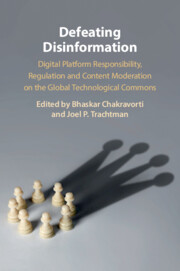Refine search
Actions for selected content:
6 results
6 - Making Social Media Pay for Its Sins
-
- Book:
- Killing the Messenger
- Published online:
- 05 September 2025
- Print publication:
- 25 September 2025, pp 118-145
-
- Chapter
-
- You have access
- Open access
- HTML
- Export citation
8 - Some Ways Forward
-
- Book:
- Killing the Messenger
- Published online:
- 05 September 2025
- Print publication:
- 25 September 2025, pp 164-190
-
- Chapter
-
- You have access
- Open access
- HTML
- Export citation
11 - Policy Approaches to Defining and Enforcing Responsibilities for Online Platforms
-
-
- Book:
- Defeating Disinformation
- Published online:
- 30 January 2025
- Print publication:
- 06 February 2025, pp 180-192
-
- Chapter
-
- You have access
- Open access
- HTML
- Export citation
2 - The United States’ Approach to “Platform” Regulation
-
-
- Book:
- Defeating Disinformation
- Published online:
- 30 January 2025
- Print publication:
- 06 February 2025, pp 7-19
-
- Chapter
-
- You have access
- Open access
- HTML
- Export citation

Defeating Disinformation
- Digital Platform Responsibility, Regulation and Content Moderation on the Global Technological Commons
-
- Published online:
- 30 January 2025
- Print publication:
- 06 February 2025
-
- Book
-
- You have access
- Open access
- Export citation
Notes
-
- Book:
- You Can't Always Say What You Want
- Published online:
- 12 January 2023
- Print publication:
- 28 February 2023, pp 229-250
-
- Chapter
- Export citation
